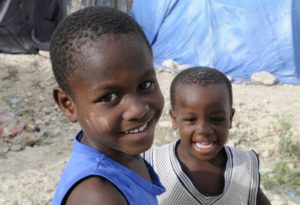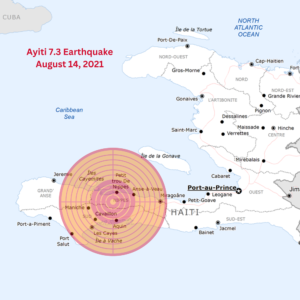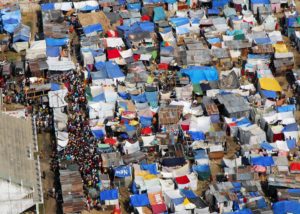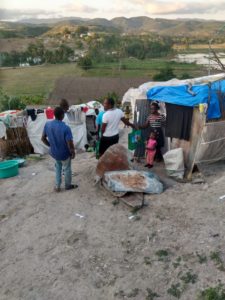The Humanist Past and Future of the Republic of Haiti
 Secular humanism can give Haiti a bright future © Arindam Banerjee
Secular humanism can give Haiti a bright future © Arindam Banerjee Sixteen months ago, a magnitude 7.3 earthquake struck the southern arm of Haiti, decimating the region. Hospitals lay in ruins, unable to treat the 12,000+ people injured in the quake. Hundreds of thousands were left homeless. Roads, bridges, power plants, and schools were destroyed and have never been rebuilt. Compromised water supply systems have led to a cholera outbreak. And while Haitians in the Southern Region continue to wait for government aid, none has come. Decimated homes still lay in rubble while families starve in encampments, sleeping beneath plastic sheets.
The August 2021 temblor was even stronger than the infamous 2010 earthquake that killed a quarter of a million people and pulverized eighty to ninety percent of buildings in Haiti’s capital, Port-au-Prince. The death toll of the more recent macroseism was smaller because the southwestern epicenter spared the populous capital from the worst damage. But the Southern Region was already suffering from extreme government neglect and inadequate infrastructure before the quake. Small, remote communities were struck hardest, yet are most difficult to access; the barriers to obtaining supplies for recovery, or even subsistence, are daunting.

The August 2021 earthquake decimated the Southern Region EC, ECHO, CC BY 4.0 via Wikimedia Commons
Amidst extraordinary need and an ineffectual state, ruthless gangs now run rampant and kidnap community members for ransom—terrorizing the whole country. Violence engulfs Haiti’s ports, and thoroughfares are blocked by armed gangs. As a result, transporting essential provisions is dangerous and expensive. The prices of food and fuel are crushing the Southern Region.
The 2021 earthquake plunged the population into darkness in the middle of already deteriorating conditions. Children, especially young girls, are sexually exploited—with those as young as ten trading sexual favors for small dishes of food. Thousands of malnourished families have joined the near-permanent encampments that burgeoned after the 2010 quake. Those living under tarps in camps are visited not by government aid workers or NGOs, but by religious missionaries who offer nothing but platitudes of resignation.
While Haiti may lack adequate infrastructure, strong state institutions, and vocational schools, religion is in no short supply. More than 100,000 churches preach passive humility and encourage Haitians to accept their suffering rather than resist and seek empowerment. What victims of Haiti’s natural and man-made disasters need most is not resignation or the empty promises of religion: they need the hope that will come when they are empowered by rational solutions to the horrors they experience daily. They need the light of reason that buttressed the country’s rich humanist past.
This is the role of Mouvement de la Jeunesse pour la Liberté de la Pensée en Haiti (MOJELIPH), a Haitian-run secular freethought NGO committed to promoting science and freethought in the Southern Region. MOJELIPH works to cultivate food security and disaster resilience with the tools of reason and science. We face our country’s harrowing challenges with confidence; we know secular humanism is our path forward. Poverty, illiteracy, agricultural collapse… MOJELIPH knows that none of these problems is solved by religion—nor should Haitians resign themselves to a tragic future. Our humanist partners around the world can help us reclaim the values upon which our country was built.

Hundred of thousands of Haitians have been living in tent cities since the 2010 earthquake
Haiti’s past is a shining example of the power of humanism in action. Perhaps more than any other country in the Western Hemisphere, the story of Haiti’s independence reflects a deep commitment to humanistic Enlightenment ideals, including liberty, equality, reason, and solidarity. While the American colonies’ Declaration of Independence proclaimed, “We hold these truths to be self-evident, that all men are created equal,” the United States enshrined slavery in its constitution and built its economy on human bondage.
In contrast, Haitian volunteers fought in the American Revolutionary War in support of America’s proclamations of equality—and its own revolution was steeped in Enlightenment principles. Those principles were never compromised in its constitution, which abolished slavery forever. After gaining independence, Haiti’s commitment to humanism did not end at its own borders but extended to the whole world.
Haiti intercepted ships of enslaved people and offered them refuge. During Latin America’s struggle for freedom, Haitian president Alexandre Pétion provided ammunition, ships, and soldiers to Simón Bolívar’s revolutionary army on the condition that Bolívar abolish slavery. Bolívar is quoted as saying, “Let future generations know that Alexandre Pétion is the true liberator of my country.”
Haiti also offered asylum to hundreds of imperiled Jews in the years leading up to the Second World War. In fact, Haiti’s 19th and early 20th century domestic and foreign policy embraced humanism in an exemplary way—with a purity and verve that has never been matched.
The story of how Haiti’s flourishing past devolved into its troubled present is long and horrifying—full of broken promises, occupation, and colonialism. The United States, along with nations in Europe, have spent the last two centuries acting in direct opposition to the humanistic values Haiti won for itself and modeled for the world.

MOJELIPH provides food and hygiene kits to families in encampments with the help of the international humanist community
With this heritage of humanism, progress, cosmopolitanism, and reason, Haiti has no reason to collapse into religious resignation. Haiti’s extraordinary challenges call for science-based solutions rather than superstition and prostration. This is why MOJELIPH does the work we do—and why we need our freethinking friends in the international humanist community to stand with us now.
Given the seriousness of the current situation in Haiti, MOJELIPH is working to set up a free and secular community restaurant. We know that the people cannot rebuild a country with empty stomachs. Thanks to the support of GO Humanity and Margaret Downey’s Freethought Society, we have begun distributing food and hygiene kits to dozens of families. But we know it is not enough. We need to establish a lasting hub in Haiti’s Southern Region to fill the empty bellies of our community members so that we can then fill their minds. We can inspire our people to once again take pride in our humanist heritage. Haiti will do great things when we return to our founding values of liberty, equality, reason, and solidarity. Are you with us?
For more information or to donate to MOJELIPH for relief work in Haiti’s Southern Region, go to givebutter.com/haiti.
